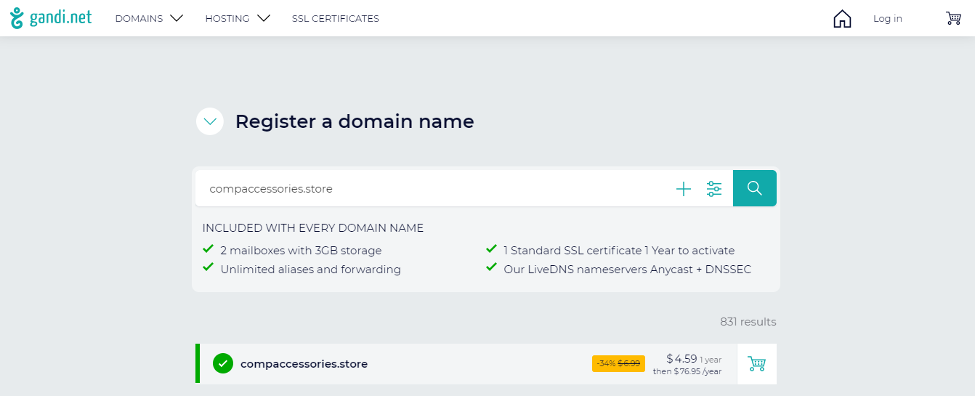Shopping online has quickly transformed from being a luxury to convenience to an absolute necessity for consumers. The eCommerce industry is growing consistently at a breakneck speed all over the world.
Here are some interesting facts:
- Global eCommerce sales are expected to be around $4.5 trillion by 2021.
- eCommerce sales are estimated to account for 13.7 percent of all global retail sales.
- The average annual growth rate of the industry is 23 percent.
- 51 percent of online shoppers use their smartphones to buy merchandise.
In today’s tech-driven world, eCommerce is an industry with incredible potential for revenue and profits. It is becoming easy for entrepreneurs to put together their online store.
They require fewer staff members, and the overheads are just a fraction of what setting up a full-fledged brick-and-mortar store would cost them.
All you need is a good eCommerce website and a great domain name. In case of eCommerce, any domain name on a .STORE domain extension will add immense value to your business.
Having the word ‘store’ in your domain name will immediately tell the user that you’re selling something online. Not only does this make your business more brandable but it also makes you stand out in a sea of competitors.
For example, look at these two domain names:
- www.computerz-accessories.com
- www.compaccessories.store
Which one of these looks more reliable and trustworthy?

Next, you need to integrate it with a reliable payment gateway, and you are ready for business.
eCommerce allows you to reach to a larger audience and more locations without having to spend a large slice of your budget on advertisements.
Therefore, it’s no surprise that many established and budding entrepreneurs are making a beeline to launch their online store. With more than half of the global population having access to the Internet, shopping online has become an effortless and convenient way of purchasing. The future is looking increasingly good for eCommerce platforms.
To help you put together your eCommerce business smoothly, you can take some tips from this well-researched checklist. It is organized based on the key challenges you are likely to face when planning, launching, and managing a profitable eCommerce business.
Starting an Ecommerce Business – The Key Steps
1. Study The Most Successful Economic Business Models
The biggest mistake that most entrepreneurs make while starting an eCommerce business is ditching the research part. It’s important to provide a solid foundation for your business, and that takes time and investment.
There are different business models to study and choose from. Understand each one of them and know how they work. Which one is best suited for your goals and budget?
If you have limited resources and do not want to invest heavily upfront, the dropshipping model is right for you. If you are comfortable investing in a large warehouse and packing it with loads of goodies, you will have a broader range of products to offer your buyers. There are other options, such as white labeling and subscriptions.
2. Research Your eCommerce Niche
It’s important to focus on a niche if you are just starting unless you have access to a huge budget. Identify a niche and focus on the companies already operating successfully in this space.
Don’t worry about the competition unless it’s cutthroat. Having no competition can also mean less potential for sales.
Choose a middle path that is not dominated by big players. A niche that has a good following on social media is an indicator of future potential if pursued properly and developed smartly.
Try to include some affiliate marketing opportunities as well. It can keep your business profitable as others will be doing the heavy lifting for you.
3. Look For Product Ideas
After identifying your niche, the next step is to find products to sell. However, before building your store there is the crucial step of identifying your target audience.
If you don’t have the profile of your audience, you will not know what to sell. You can begin small and focus on specific demographics.
Now comes the search for products. It is a crucial step and can consume a big part of your budget.
Invest less initially and keep testing the waters until you get an idea of the market’s depth and how to negotiate it.
Get a feel of the products, even if you have chosen the dropship model. This will help you know the product better and prepare you to answer customer queries better.
4. Register Your Business
Work on creating a brand image around your eCommerce business. Choose designs and colors that your audience can quickly identify with and recollect too. The brand image must be commensurate with your business niche.
Choosing a business name for your eCommerce enterprise must involve some deep thinking. A brand name is for keeps and that’s why it’s essential to think long term when you choose a name for your business.
Registering your company is mandatory, as it will ensure that you comply with the local, state, and federal rules.
Next comes the licenses. There are few routine ones and a few unique ones, specific to the eCommerce industry.
Not sure how to go about it? Hire a consultant. They will advise you accurately and also walk that extra mile to ensure that your business is ready for a hassle-free launch at the scheduled date.
Your consultant will also guide you in obtaining any necessary permits and licenses. These are needed for many business transactions, including opening a bank account and filing taxes.
5. Find The Right Vendors
The only way of beating the intense and growing competition in the eCommerce industry is to price your products competitively and provide more value to your customers.
This can be done only when you have the right vendors to support your business initiatives. Again, research is vital as many vendors are waiting to serve you, but not all of them might be on the same wavelength.
Find one who is compatible with your business idea and always think long term while choosing vendors.
6. Develop Your Business Plan
This is the final step in the eCommerce business launching process. When you have everything else in place, the next step is to develop a killer business plan that can provide a firm outline of various aspects of business operations.
Finance is one of the crucial components of any business plan. The plan must identify the point where you can break even and chart the course to reach there.
Projection of sales, revenues, and profits is a must before you start selling online. It will give you a target to focus on and a road map to hit the target.
Business planning also involves other vital elements of business such as staffing, logistics management, shipping concerns, contingency planning, etc. You must have a clear idea of the financial resources available to you so that any tweaking or diversion from the charted route can be done if and when needed unhesitatingly.
7. Attract Customers To Your Store
When all the nuts and bolts are in place and you are ready to sell, don’t expect customers to make a beeline to your store. First, they need to know you exist. Then, you must convince them you are the best. That takes some effort. And that’s where marketing comes into play.
Use the services of an online marketing professional to identify the right keywords, write captivating product descriptions, choose high-quality images, and create a powerful SEO strategy for your business to rank high on the leading search engines.
Your customer service must also be of impeccable standards to attract customers and make them come back for more.
To become a top eCommerce business site, you must invest heavily in online marketing. Know how the digital marketing industry works and implement the right strategy to drive traffic and leads and improve conversions.
There are many ways of attracting customers. It can be a bit overwhelming to handle marketing on your own. Hiring an expert is highly recommended.
Conclusion
By using this detailed checklist and ticking all the boxes, you can save loads of time and effort. There are incredible opportunities and immense potential in the eCommerce business. You must know how to leverage the right resources to maximize the benefits.
Alisha Shibli
Alisha is a Senior Content Marketing & Communication Specialist at Radix, the registry behind some of the most successful new domain extensions, including .ONLINE and .TECH.




